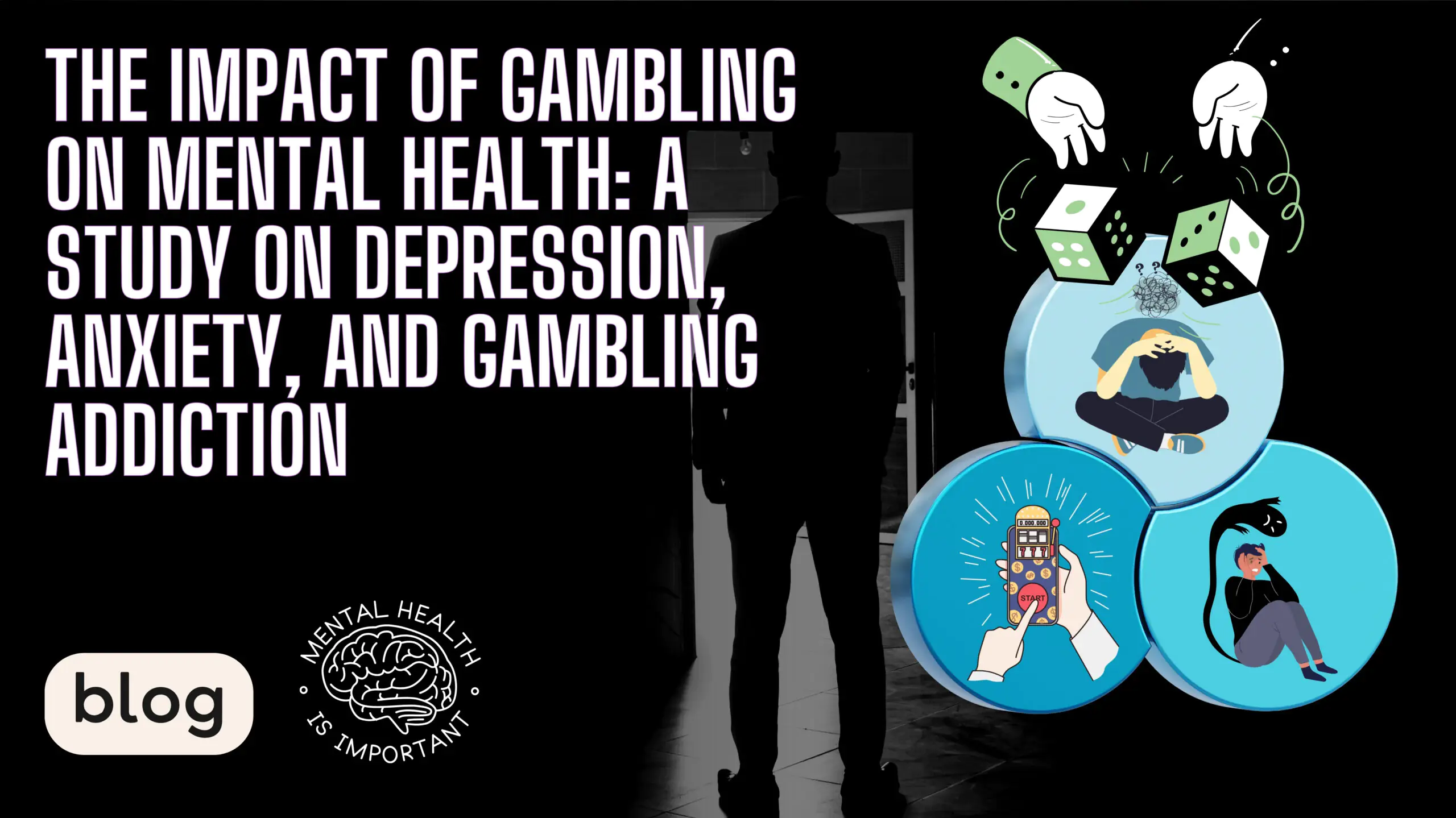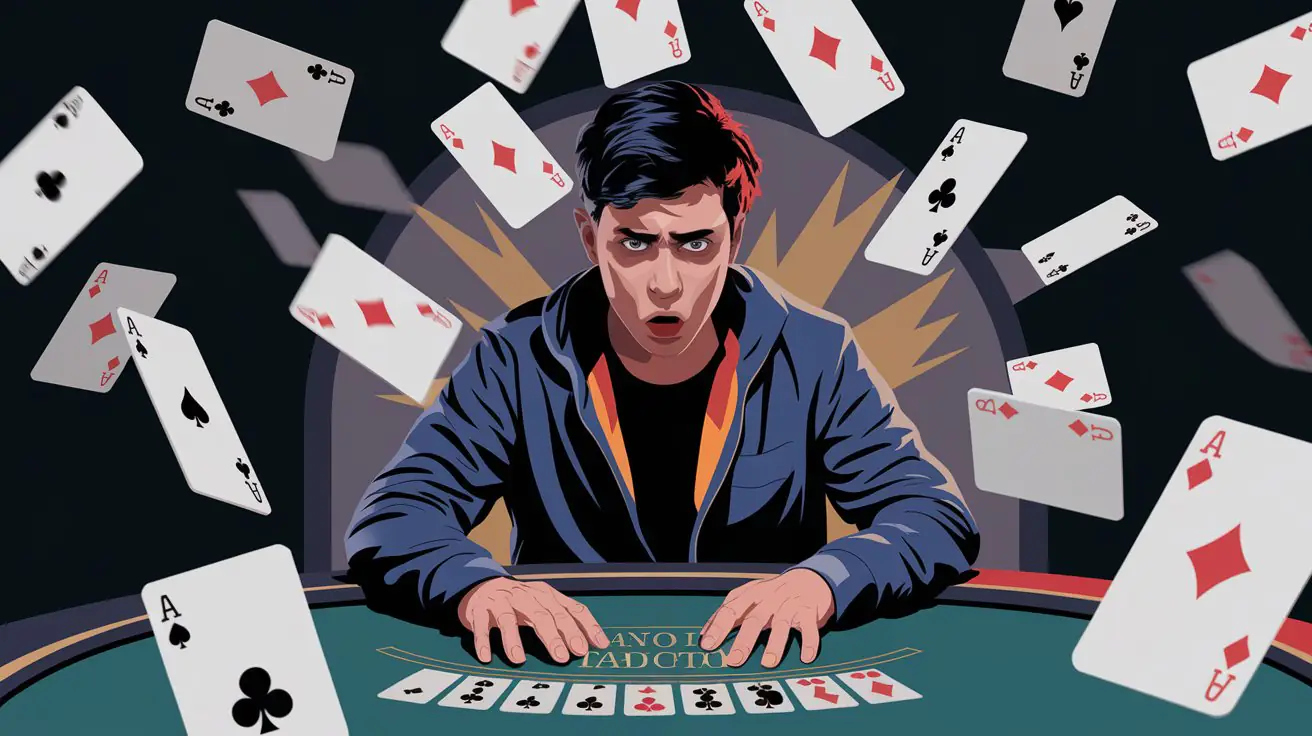
The Impact of Gambling on Mental Health: A Study on Depression, Anxiety, and Gambling Addiction
As gambling is becoming more accessible than ever before, it has become a significant concern for the public and mental health, especially among adolescents. While some people may gamble responsibly, the so-called problem gambling or irresponsible gambling tends to be fairly prevalent. Globally, irresponsible gambling occurs in about 2.43% while gambling addiction occurs in 1.29% of the adult population.
Gambling can be a dysfunctional way for both adolescents and adults to cope with stressful events by dissociating or trying to escape from private problems – up to 46% of adults and 17.9% of adolescents report gambling activities in the past year, with 8.7% of adults engaging in risky gambling that may lead to addiction. Individuals who gamble have significantly higher rates of anxiety, depression, low self-esteem, and substance use. Modern types of gambling such as online gambling, are increasing the severity of this problem as people now don’t even need to leave the house and go to a venue to be able to gamble. It is vital to outline ways to fight this addiction and raise awareness in order to reduce the number of new addicts.
Gambling and Depression
Compulsive gambling can become an addiction, similar to drugs or alcohol. It also affects the part of our brain that releases dopamine, a “feel good” hormone, among others. Winning a bet provides an emotional reward, and other pleasurable activities may no longer make us feel that good. People with ongoing mental health problems are more prone to step into harmful habits of gambling. They may gamble to feel better about themselves when depressed, or simply to distract themselves if they are angry or upset about something. It is estimated that up to 76% of problem gamblers also suffer from depression.
Primary and Secondary Depression
Pathological gambling can directly trigger or worsen symptoms of depression, generalized anxiety, obsessions, and personality disorders. It is important to distinguish primary depression from situational depression caused by an ongoing gambling problem. Depression that exists prior to the onset of gambling behaviors suggests that gambling serves as a form of self-medication.
Risk of Suicide and Gambling
Either way, gamblers will likely manifest escalating symptoms of hopelessness, guilt, shame, and desperation. One of the most serious results of pathological gambling is an increased risk of suicidal thoughts and attempts. After experiencing significant losses, pathological gamblers may consider suicide. Nearly 80% of gamblers who contact a gambling helpline have reported feeling suicidal at the time of their call. Heightened impulsivity, the presence of mood disorders, and depression caused by financial debt are a combination shown to be related to suicidal ideation in pathological gamblers.
Gambling and Anxiety
Gambling: Anxious Business
Pathological gambling not only significantly affects depressive symptoms but also has a direct impact on anxiety levels. Many pathological gamblers experience increasing tension before gambling, which they can only relieve through gambling. Some feel anticipatory anxiety, which may be described as pleasurable, fearful, or unpleasant. Others use gambling to reduce general anxiety by escaping from reality and temporarily avoiding life responsibilities. Having all this considered, for some individuals gambling can have a calming effect.
Chasing the Losses
Gamblers experiencing a significant financial loss tend to immediately chase their losses within the same day: not being able to recover their money results in a feeling of intense anxiety, fear, and worry. This leads to a cycle where the gamblers are focused on alleviating this anxiety through more gambling. Generally speaking, significant financial loss worsens anxiety and creates a feeling of guilt, especially among people who have someone they have to take care of (e.g. parents, children). People trying to quit or cut back on gambling may experience withdrawal symptoms including heightened anxiety levels.
Case Studies and Real-World Examples
Gambling and Other Addictions
Many individuals with proneness to addiction who have struggled with substance abuse and then turned to gambling, describe gambling as very similar to addiction to drugs. The same feelings of shame and depression ensue as when one would feel when using something as dangerous as heroin. Some recovering gamblers pointed out they encountered a problem known as “secondary addiction”. This problem refers to a situation when one gets addicted to things that are legal like alcohol and gambling while trying to deal with one’s original problem, such as depression.
Case Study
Trevor (name was changed to assure anonymity of the patient) was a serious gambling addict with a “binge” gambling pattern. Whenever he felt lonely, sad, or depressed, Trevor would resort to gambling. He had a somewhat poor education background, spending a lot of time in foster homes, and over years developed a dysfunctional pattern of gambling. Initially, Trevor got into contact with gambling when he was a teenage, but in these early years he did not really spend too much money. Slowly, however, and especially as Trevor started earning more money, his habit got out of hand. He started to have issues controlling his gambling, and would go on occasional binges at the end of which he would have barely anything left. With significant losses, Trevor managed to curb his binge-gambling and was able to have a stable family life, finding a partner and having a baby when he was around 30 years old.
The relationship, unfortunately, quickly ended and Trevor started to alleviate his psychological suffering and depression by turning to his old habit-gambling. It is clear in this case that the gambling habit started somewhat spontaneously and that Trevor had an important predisposition towards developing gambling addiction. However, we can also see how important life events – such as a relationship breakup – can act as a trigger, bringing old problems back.
Seeking Help
The main problem many recovering gamblers and addicts point out is the fact that they didn’t try to do something about it, even if they knew it was bad for them. The desire to change would then arise only when something drastic had occurred, like in extreme cases the death of a loved one involved in the problem, or the loss of housing due to insurmountable debts. Doing something early on can vastly increase the chances of your problem being resolved without more serious consequences, although it will still be a rocky journey.
Prevention and Intervention Strategies

The risk of addiction increases during times of stress and change, so it’s important to recognize risky periods and turn to healthy coping mechanisms. This could involve exercise, finding a hobby that does not drain your budget, or seeking professional help to talk about your issues. Gambling exclusion programs might also be a good idea in this context.
In terms of prevention, avoiding gambling altogether is the most obvious approach. However, if you find yourself engaging in gambling, try to limit it from the very beginning. Keep track of how much money and time you spend on gambling, and if you feel it is affecting your daily life, seek help right away. Understanding your family history can also provide insight into your behavioral addictions – if you have cases of gambling or drug addictions in your family, chances are that you have an increased risk of developing the same sort of problems as well.
For individuals already battling with gambling addiction, there are several types of therapy that can help with this problem:
- Cognitive Behavioral Therapy (CBT): This is a structured, goal-oriented therapy where a professional can help you understand how your thoughts affect your actions. This form of psychotherapy is used to reduce symptoms of PTSD, depression, and anxiety disorders.
- Psychodynamic Therapy: This therapy focuses on unconscious processes affecting one’s behavior, with the goal of increasing self-awareness. Although it is often mixed with psychoanalytic therapy, it is important to make a distinction between the two. Psychodynamic therapy is evidence-based and relies on interpersonal relationships between client and therapist, rather than relying on psychoanalytic theory.
- Group Therapy: Similar to other anonymous addict groups, this therapy involves people meeting to discuss their problems and provide insight into others’ problems under the supervision of a mental health professional. This type of therapy provides a source of motivation and moral support, as people in need can talk to people who feel the same way and understand their point of view.
- Anonymous Gamblers: There are many groups of this type providing emotional and practical support to people who have issues with gambling. A positive side of these groups is that you can meet a lot of people who have similar problems as you and who are already at advanced stages of recovery, so that they can offer you actionable advice on what to do, what to avoid, and how to behave in order to get better.
Conclusion
Pathological gambling is a psychiatric disorder that has numerous negative consequences, many of which could be prevented with early recognition and treatment. Most people who gamble will be able to do so without permanent consequences, yet for those who become pathological, the consequences are permanent and destructive. Left unrecognized or untreated, pathological gambling can lead to devastating consequences in a rapid fashion, highlighting the critical need for early intervention and prevention efforts.
In addiction, pathological gamblers are likely to suffer from a number of other mental health issues, such as depression, other addictions, anxiety, personality disorders, etc.






